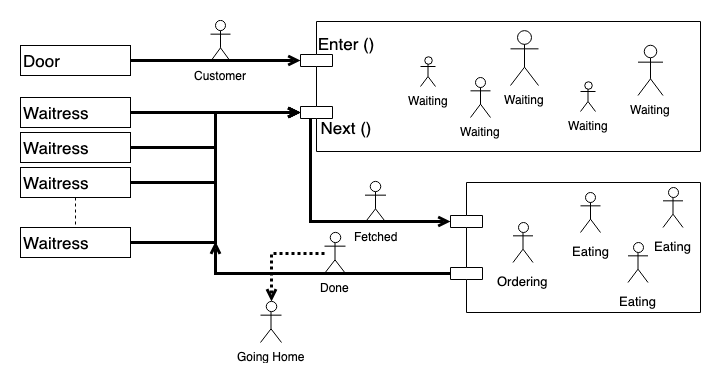Customer is the object passed around by the consumers and producers.
WaitingArea is the shared resource/buffer of the program. Both the producer and the consumers try to access this object.
The object has to main function as you can see in the figure. enter() takes new customers and puts them in the waiting area. next() takes customers out of the waiting area. Both of these functions access the same pool of customers, here implemented as a ArrayList.
Door is the producer of this simulation. The Door creates a new customer based on a global interval. The door thread calls the enter() method when it creates a new customer. If there is no room in the waiting area it will wait(). When it's allowed to place a customer in the waiting area it will call notifyAll(). This will signal all wait waitresses that a new customer is waiting to be fetched.
Waitress is the consumer of this simulation. There are multiple waitresses that try to fetch customers from the waiting area. The waitresses call the next() method to fetch a new customer they can serve. If the waiting area is empty the waitress will wait(). If the waitress gets to fetch a customer they will call notifyAll() to signal to the Doors that there is room in the waiting area for a new customer.
Sushibar.java is the main entry point to the simulation. It sets global variables and starts all the threads.
Clock.java is started at the beginning of the simulation, and when it gets to zero it sets the sushibar to closed.
SynchronizedInteger.java helps with keeping static counters stable
Output.java helps prints to the terminal in different colors, to help differentiate what output comes from what thread.
wait() sets the current thread (the one running the line) to wait indefinitely.
nofity() wakes up a thread that is set to wait().
notifyAll() wakes up all threads set to sleep by wait().
All the shared variables are managed by using the SynchronizedInteger class. As all the method are declared using the synchronized keyword, only one Thread can access it at once.
List of shared variables.
- SynchronizedInteger customerCounter;
- SynchronizedInteger totalOrders;
- SynchronizedInteger servedOrders;
- SynchronizedInteger takeawayOrders;
There are also other shared resources. More specifically the shared ArrayList that holds Customers. This used by both the Waitress threads and the Door threads. This shared resource is also managed by declaring the functions are synchronized.
This is done by the main thread. When we join() all the waitresses, main is set to wait for them. So it will run the last bit of code when they terminate.
